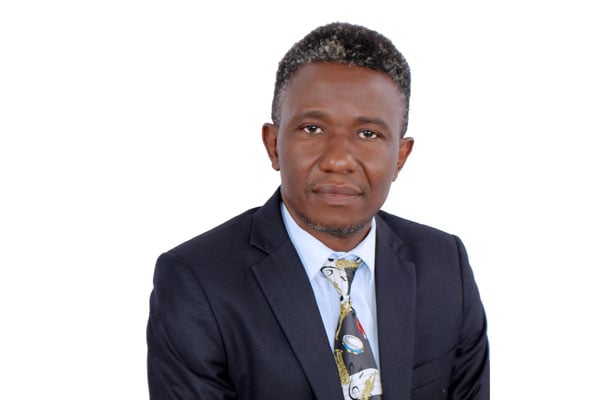Prime
Ssemakadde: Legal rebel eyes the ULS presidency

Isaac Kimaze Ssemakadde. In setting his eyes on the ULS presidency, Ssemakadde has indicated that a reconfiguration of the justice system in Uganda is long overdue. photo/FILE
What you need to know:
He has chosen to frame his candidature for the Uganda Law Society (ULS) presidency on a move away from the hegemonic, if not Eurocentric, conception of law connected to legal cultures historically entrenched in colonialism in Africa toward a more inclusive legal culture
Decolonisation, which among others translates to changing pedagogies to be more inclusive and revising curricula to be alive to the knowledge from the global south, has dominated the bill in African ivory towers for some time now. It has also been the pet subject of lawyer Isaac Kimaze Ssemakadde, whose promises to decolonise Uganda’s legal system have been persistent.
Law in Africa has followed the standard and structure of the legal systems of the colonising powers—the English, French, Spanish and Portuguese. Consequently, proponents embracing the decolonial turn say indigenous laws ought to be safeguarded. Uganda is among the English-speaking countries in Africa that have enacted legal pluralism in order to include customary law. Having thought about the idea of decolonisation, Ssemakadde has chosen to frame his candidature for the Uganda Law Society (ULS) presidency on a move away from the hegemonic, if not Eurocentric, conception of law connected to legal cultures historically entrenched in colonialism in Africa toward a more inclusive legal culture.
Ssemakadde has specifically pointed at the Advocates Act.
“The reality is that few clients can pay lawyers a salary in the due course of the case, but, as things stand, lawyers are not getting what they deserve after the case is heard. When they win, the costs are determined by the judges and registrars. The bill of costs in most cases is slashed. It’s the judges who determine what a lawyer will earn,” Ssemakadde says.
He adds that the current Attorney General (AG), Kiryowa Kiwanuka, to the detriment of lawyers, has pursued a policy of cutting out law firms from the process of payment of court awards.
“The AG says the money should go to the clients as if he doesn’t know the economic realities of Uganda. If the client was able to trust the advocate throughout the process, then why does the AG think the advocate will now reap off the law client?” Ssemakadde says, adding that he with several lawyers, including former ULS president John Matovu, are battling graft-related charges emanating from the way they are remunerated.
Media freedom
In October 2016, five media houses—The Observer, Daily Monitor, Uganda Radio Network (URN), The New Vision, The Red Pepper—were summoned by Parliament’s Rules, Discipline, and Privileges Committee over what MPs construed as negative coverage arising from the media coverage of lavish expenses of the August House. Instead of appearing before the House committee, Robert Spin Mukasa, The Observer editor, decided to hire the services of Ssemakade. The lawyer didn’t disappoint.
“Your letter summoning our client to appear before the committee on Wednesday, October 5, 2016, at 10am, is impermissibly vague and invasive of our client's editorial independence, among other constitutional rights, which you are oath-bound to respect, protect and promote,” Semakadde wrote on behalf of Mukasa, effectively ending the proceedings before they could even start.
When Ssemakadde talks about media freedoms and freedom of expression, he follows it with actions as was the case in 2014. The trial of Ronald Poteri, a detective who was accused of stealing and later leaking recordings of then Inspector General of Police Gen Kale Kayihura talking to then Prime Minister Amama Mbabazi’s alleged youth supporters had gripped the country. Then Buganda Road Chief Magistrate Lillian Bucyana threw the spanner into the works when she banned the media from covering the trial.
This was after being prompted by Principal State Attorney Lino Anguzu, who claimed that the nature of the evidence available once publicised might cause disorder in the police and the Cabinet. Ssemakade once again available, and free of charge, helped the Uganda Court Reporters Association (UCRA) to upend Bucyana’s order to the High Court through a judicial review application.
In taking on the AG, Ssemakadde requested Justice Lydia Mugambe, the presiding judge, to declare that Bucyana’s order wasn’t in conformity with the principle of open justice. In her judgment, Justice Mugambe agreed with Ssemakadde and recognised the importance of open justice and the role of media access “…if the state objects to the release of the information, it must provide evidence to support its claim of secrecy. It cannot be a mere invocation of security and privileged information. The courts have to balance the competing rights and determine whether a matter falls within the exception of Article 41 of the Constitution,” Justice Mugambe ruled.
“To satisfy the requirement to find a balance between the two rights, the magistrate court should have requested evidence from the state to support its secrecy claim. The magistrate court also should have evaluated the nature of the limitation sought by the State and verified that its purpose could not be achieved through less restrictive means.”
Citing Article 28 of the Constitution, Justice Mugambe averred that “the magistrate court should have properly evaluated the dangers of the in-camera proceedings to decide if such a limitation was sufficient in a free and democratic society.” With that, she quashed the proceedings that had happened in Bucyana’s court and ordered Poteri to be tried again in the presence of the media. The trial that had put the country on tenterhooks didn’t take place since upon the media’s return to court, the prosecutors, for some reason, withdrew the charges.
Open justice
The principle of open justice has been at the centre of Ssemakadde’s ideal Judiciary. It also includes the process of recruiting judges that continues to be shrouded in mystery.
“They are content to normalise the undemocratic status quo and perpetuate the worrisome culture of elitism and corruption, in which their ‘golden calves' are the biggest winners,” Ssemakadde once said.
“Clearly, how can you transform the Judiciary by sticking to business as usual? How can you imbue the much-needed diversity, intellectual rigour, and national consciousness in the Judiciary when the appointment process is still treated as a passage rite controlled exclusively by a handful of ‘high priests’ instead of the whole community?”
By his own admission, Ssemakadde, who has christened himself as atanaaba (the unwashed one), is naturally stubborn. He likes to push boundaries to the limit. In Uganda, when at law school, students dream about working with big law firms like Kampala Associated Advocates (KAA), MAAKS, Katende & Ssempebwa advocates or AF Mpanga Advocates, which now trades as Bowmans in Uganda. Ssemakadde started out at AF Mpanga Advocates, a firm whose specialty is commercial and corporate law. After performing well during clerkship, the firm’s honchos wanted to retain Ssemakadde. He stunned them by rejecting the offer.
“My interest was never in commercial law and that’s the direction that law firm was taking,” Ssemakadde told this writer. “My interest has always been in public interest litigation.”
Not long after, Ssemakadde co-founded Legal Brains Trust with the intention of providing legal services principally for the downtrodden.
It was the latest chapter in the story of a boy from Mbulire Village in Bigasa, then in Masaka, now Bukomansimbi District. Soon, he would be squaring off against powerful forces. In 2013, he challenged sim-card registrations and later the deactivation of unregistered sim-cards.He lost both cases for myriad reasons but remained firm.
“In each of these cases, you learn something and you go back to the drawing table and strategise. I don’t believe in mourning,” Ssemakadde once told this writer while going through a heap of court files at his office found at Teachers House in Kampala.
In 2019, former Makerere University lecturer Dr Stella Nyanzi, his client, was involved in one of the most chaotic trials in contemporary history. From the start, Ssemakadde and Nyanzi felt that magistrate Gladys Kamasanyu was exhibiting bias in the case in which the latter was accused of insulting President Museveni’s deceased mother, Esteri Kokundeka, in a viral Facebook post.
Halfway through the trial, Ssemakadde recused himself. He cited Kamasanyu’s apparent bias.
“I will wait for them in the High Court,” he said as he stormed out of court “I have no business in this court.”
Kamasanyu went on to sentence Nyanzi to 18 months in prison for cyber harassment. Ssemakadde had the last laugh a few months later when, upon appeal, Justice Henry Peter Adonyo, quashed Kamasanyu’s findings on grounds that prosecutors had failed to prove that Nyanzi was in Uganda by the time she fired off the viral post.
In setting his eyes on the ULS presidency, Ssemakadde has indicated that a reconfiguration of the justice system in Uganda is long overdue.
“The system the British brought here was an unjust one. This is why up to today, there is no jury system in Uganda. The judge is both the judge and also a personal jury. This is not real justice,” he said.





